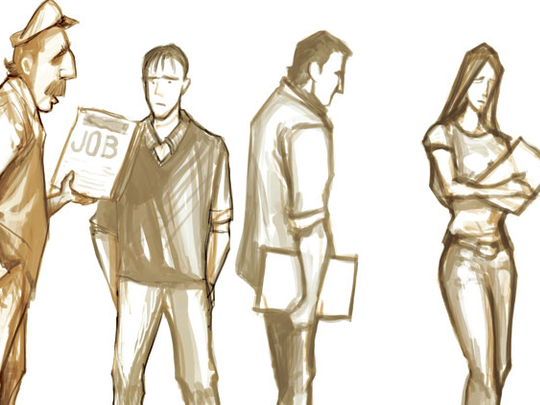
Economic orthodoxy has been turned on its head during the Great Recession of the past three years. Left to their own devices, markets have proved to be neither rational nor stable. They don't miraculously come up with perfect solutions.
Unemployment is a case in point. According to neoliberal theory, those countries that had the most flexible labour markets would find it easiest to adapt to the more challenging environment, while those countries that insisted on featherbedding their workers would reap the consequences of being soft.
It hasn't worked out like that. There are, according to estimates, 210 million unemployed people around the globe, an increase of 30 million since 2007. The largest increases have been in the US, the home of the hire-and-fire culture, and Spain, which developed a two-tier labour market in which temporary workers enjoyed fewer rights than their full-time colleagues. Youth unemployment in Spain has doubled to almost 40 per cent.
In contrast, in Germany and Norway two countries that have strong trade unions and long traditions of collective bargaining the unemployment rate barely budged.
Legacy
Workers swallowed pay freezes and pay cuts, while the government spent money on job placements. Despite pressure from the unions, however, Labour decided against directly subsidising jobs, a scheme which in Germany was largely responsible for preventing unemployment from rising.
The experience of past recessions shows that the legacy of the past three years will be long lasting. Unemployment at an early age can leave permanent scars; studies in the US have shown that someone laid off during a recession will suffer an earnings loss even when they get back into the labour market.
Children suffer when parents go into less well-paid employment and earn less than those fortunate enough to remain in work. Even 15 to 20 years later these losses amount to 20 per cent on average.
A recent paper by Carmen and Vincent Reinhart, After the Fall, says that after economic shocks , the stagflation of the 1970s and the current crisis it takes far longer for growth and employment to recover.
Next week, the International Monetary Fund and the International Labour Organisation are holding a conference to discuss ways of tackling a slow jobless recovery. Both bodies have prepared a section of a joint paper for the meeting, and the IMF's contribution is something of a slap in the face for Britain's coalition government.
The IMF has had something of an intellectual make-over under its managing director, Dominique Strauss-Kahn, and looks more like the institution originally envisaged by Keynes in the 1940s.
The joint report has two main themes, with the IMF dealing with the immediate employment crisis and the ILO concentrating on the need to build an employment-oriented framework for growth.
Quite clearly, the IMF thinks governments should be wary of withdrawing support for growth. "As a general strategy, most advanced countries should not tighten their fiscal policies before 2011, because tightening sooner could undermine recovery," it says.
In developed countries during the past three decades, tightening fiscal policy by 1 per cent of national output has raised the unemployment rate by 0.3 percentage points.
The IMF study makes two other points relevant to the current debate about UK economic policy. The first is the concern expressed that austerity plans dominated by spending cuts, as is the case in the UK, have led to widening inequality.
Last month's Institute for Fiscal Studies report on Osborne's emergency Budget was damning in this regard: the measures announced in June hit those on the lowest incomes hardest.
The second point concerns the coalition's decision one of its first acts to scrap Labour's hiring subsidies. While the IMF has its doubts about the indiscriminate and permanent use of job subsidies, it says they have a role to play in deep recessions. Any inefficiencies caused by allowing employers to free-ride or get money for hiring people they would have employed anyway are likely to be less costly than those of persistent unemployment.
Half the battle
But having the right policies to create jobs is only half the story. As the ILO paper notes, one of the factors that helped cause the crisis of 2007 was growing inequality. "In some countries, and particularly in the US, increasing inequality may have led to increased indebtedness of the household sector and thus an important factor in explaining the sub prime mortgage crisis," it says. This is an accurate description of the trend of the past 30 years, in which labour has taken a smaller share of national output. The concentration of wealth, the attacks on trade unions and the whittling away of welfare have all contributed to both greater inequality and greater instability.
The message from these two papers is as follows: the risks of entrenching high levels of unemployment mean that economic policy should have a bias towards growth. There should be no fetish for austerity and targeted measures aimed at vulnerable groups of workers should be retained. In other words, we need to junk the right-wing dogma that has dominated economic thinking for the past 30 years. And, in the case of the UK government, still does.












